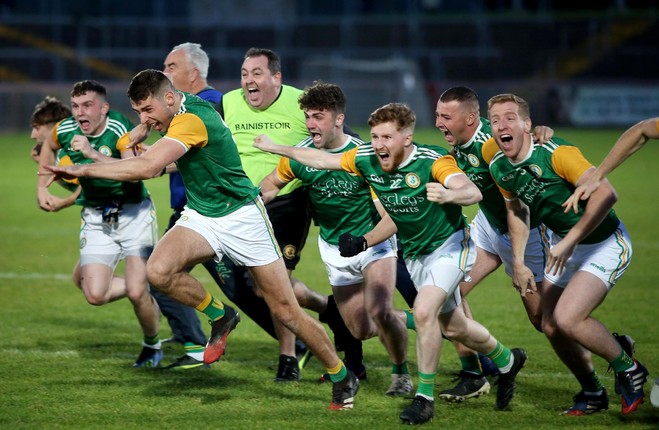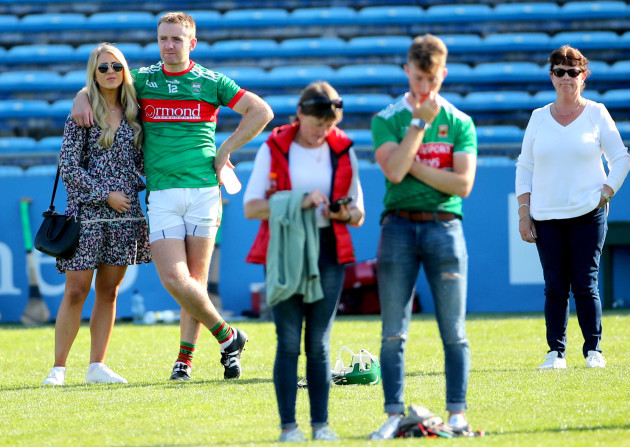THE DUNGANNON THOMAS Clarkes club could never be accused of taking the easy route when it came to eventually achieving Tyrone senior football glory.
Last night in Omagh they ended a 64-year wait for the title, pushed to the limit every step of the way in a dramatic campaign.
In their first round they trailed Loughmacrory by two points late on but dug out a draw and won by ten after extra-time. Then came a quarter-final against Ardboe, a couple of Paul Donaghy points rescuing another draw before they hit the last five scores of the game in the additional period.
The semi-final with Errigal Ciaran followed a similar theme, three points at the finish from substitutes pegging their opponents back and it was corner-back Ciaran Barker who stepped up to nail the ’45 after the game had passed the 80 minute mark, that secured a slender success and a berth in the final for the first time in 34 years.
And then last night’s final transpired into another marathon affair. Nothing separated the teams after normal time or after extra-time before Dungannon held off the reigning kingpins Trillick in a penalty shootout. Barker was again the hero as he applied the finishing touch, despatching the kick that sealed a 9-8 success.
The wild scenes of celebrations in Healy Park were natural and familiar. The manner in which the ambition was realised was something different.
If penalty shootouts were largely thought of a concept confined to other sports, they are a reality the GAA is starting to face more and more. The stage was different, a county semi-final, but the scenes in Tyrone were replicated in Offaly when it came to settling matters yesterday evening.
Ferbane, the reigning champions, and Tullamore were locked together after close to an hour and a half’s worth of play. It meant spot kicks were required to determine who would advance to meet Rhode in the senior football final. Tullamore got over the line by the same margin as Dungannon.
'The Blues' are through!
— Official Offaly GAA (@Offaly_GAA) September 21, 2020
Watch the nine penalties that @tullamoregaa scored in their epic shoot-out with Ferbane in the Senior Football Championship semi-final at Bord na Mona O'Connor Park yesterday. Niall Stack's men will meet Rhode in the final. pic.twitter.com/qR0pnYMRu8
The concept of a winner on the day, by whatever means necessary, jars with some. The provision for replays is generally present in club championships but that is an ordinary fixtures calendar with plenty room for manoeuvre. That is not a luxury afforded to fixture makers in 2020 and they have reacted accordingly. Considering at one stage how faint the hopes were of having any sort of meaningful action this year, county boards can be satisfied at rounding off their business and handing over a trophy. Even if it is after a process viewed as alien by some.
The conflict arises in that not all championships are being settled in the same manner. On the Ards peninsula on Saturday afternoon the meeting of local rivals Portaferry and Ballycran, in their neighbouring club of Ballygalget, was the biggest day on the Down club hurling calendar. It was a pulsating game, finishing 2-18 apiece, but a replay will be played to determine the victor.
The Armagh junior final between Belleek and Forkhill finished deadlocked, 2-9 to 1-12, on Saturday evening and there was no extra-time as they headed straight to a replay which will be played on Friday night. Even across the water in Gaelic Park a draw was the order of the day in the New York senior football showpiece. Round two is pencilled in for next Sunday.
New York Senior Football Championship Final Update
— Newyorkgaa (@NewYorkGAA) September 20, 2020
Extra Time
St Barnabas 1.16
Sligo 1.16
Full time. Draw. Extra Time. Draw.
Both teams gotta do it all over again.
REPLAY! GOODNIGHT 🥵#gaa #Newyorkgaa #nysfc
The discrepancies across counties will be a source of irritation to players. But the lack of uniformity of approach comes from the variety of bodies organising the fixtures. Operating in tight confines has influenced the decision-making in 2020.
It is a challenge for players to prepare for a penalty shootout, particularly if they have undergone an energy-sapping encounter. An extended hurling or football match will rattle along at a faster pace than their soccer equivalents. It is still a better outcome than the ’45 or ’65 point-taking competitions which were trialled and always seemed an artificial construct.
And there is a fault in the arguments that protest it is too cruel a process in which to decide a game. The devastation for the Trillick and Ferbane players is understandable. But it is hardly worse than how Noel McGrath and his crestfallen Loughmore-Castleiney team-mates felt at having victory snatched away from them in that frantic finale in Thurles yesterday?
Watching your opponents fire a match-winning point or goal in injury-time can be as gut-wrenching as stand in the middle of the pitch as a shootout develops. Complaints over fairness are a red herring, in sport there is no sense of justice in determining who wins or lose. That is part of the beauty of it. As a form of tense drama and nerve-shredding entertainment, penalties succeed.
Manager James Woodlock confessed he was not a fan of them last month after watching his Drom & Inch team win a cracking quarter-final that ended the reign of champions Borris-Ileigh. ‘It’s an awful way to finish a game’, was the summation of the ex-Tipperary player. It certainly must have been hard for Brendan Maher to stomach after shooting 0-12 in a brilliant display of markmanship during the game only for later then to see his penalty saved.
Suggestions like a golden score or additional extra-time create the prospect for a random action to influence the outcome as well. It is not guaranteed they will ensure a sense of fairness for players. There is no simply solutions here in order to arrive at the best winner. The pain of defeat is not easily softened and will always spark regrets.
On the day of that Drom & Inch win, Kiladangan’s second senior team won a relegation play-off. The Tipperary coach Darragh Egan saved and scored a penalty in the shootout.
Yesterday in the dying moments, just before John McGrath nudged Loughmore in front, the Kiladangan sideline was a hive of activity as they attempted to get Egan into the action with an eye on utilising his striking for the shootout.
The issue was settled amidst high drama but the thinking hit at the importance for teams adapting and factoring penalties into their planning.
There can be a wider debate on the merits of penalties but it will require a longer and more routine season for that.
In the circumstances of a volatile GAA year, there must be some acceptance for change.
The42 is on Instagram! Tap the button below on your phone to follow us!



